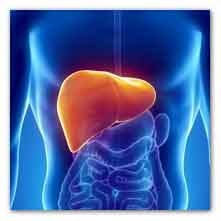|
New research in The Federation of American Societies
for Experimental Biology FASEB Journal suggests that
the future development of novel treatments for
alcoholic liver disease may focus on counteracting
alcohol's effect on vitamin A levels in the liver.
With a name like "Alcoholic Liver Disease," you may
not think about vitamin A as being part of the
problem. That's exactly what scientists have shown,
however, in a new research report appearing in the
September 2015 issue of The FASEB Journal.
In particular, they found that chronic alcohol
consumption has a dramatic effect on the way the
body handles vitamin A.

Long-term drinking lowers vitamin A levels in the
liver, which is the main site of alcohol breakdown
and vitamin A storage, while raising vitamin A
levels in many other tissues. This opens the doors
for novel treatments of alcoholic liver disease that
focus on counteracting alcohol's effect on vitamin A
in the liver.
"We hope this study will lead to a broader
understanding and appreciation of the fact that
excessive consumption of alcohol has a negative
effect on vitamin A function in the body," said
Robin D. Clugston, Ph.D., a researcher involved in
the work from the Department of Medicine, Division
of Preventive Medicine and Nutrition at Columbia
University Medical Center in New York, New York.
"Ultimately, we hope that vitamin A will be seen as
a broad target for alcohol in multiple tissues of
the body and that our understanding of
alcohol-induced disease will be linked together by
its effects on vitamin A."
Clugston and colleagues conducted multiple
experiments using several groups of mice including
those who received alcohol-containing food and
alcohol-free food.
They analyzed the liver and other organs (i.e.,
kidney, spleen, heart, lung, white adipose, brown
adipose and blood), from both groups of mice and
measured tissue vitamin A levels.
The alcohol-fed mice had distinct changes in how
their body handled vitamin A. In general, vitamin A
levels were lower in the liver and higher in other
tissues.
"This research not only give us new insights into
how chronic alcoholism affects vitamin A in the
liver," said Gerald Weissmann, M.D., Editor-in-Chief
of The FASEB Journal, "but it also sheds light on
how our body processes vitamin A overall.
This is particularly important since some people get
too much vitamin A through 'supplements,' while
others still do not get enough because of poor
access to proper nutrition."
See also
Vitamin A supplementation may cause the immune
system to forget past infections (2015-07-19)
link...
Rob J. W. Arts, Bastiaan A. Blok, Reinout van Crevel,
Leo A. B. Joosten, Peter Aaby, Christine Stabell
Benn, and Mihai G. Netea.
Vitamin A induces inhibitory histone methylation
modifications and down-regulates trained immunity in
human monocytes.
J. Leukoc. Bio.l July 2015 98:129-136;
doi:10.1189/jlb.6AB0914-416R
link...
For more information
Robin D. Clugston, Li-Shin Huang, and William S.
Blaner. Chronic alcohol consumption has a biphasic
effect on hepatic retinoid loss. FASEB J. September
2015 29:3654-3667; published ahead of print May 18,
2015, doi:10.1096/fj.14-266296 ; http://www.fasebj.org/content/29/9/3654.abstract.
link...
MDN |